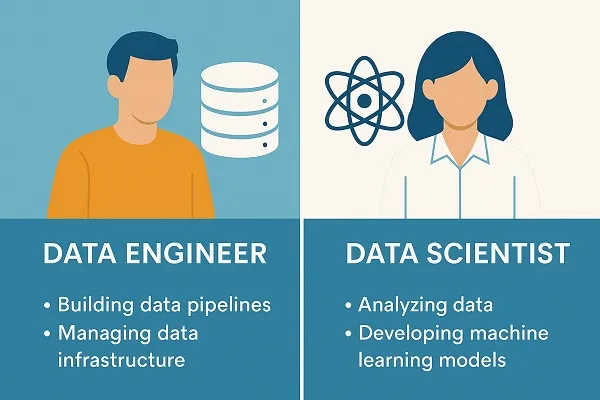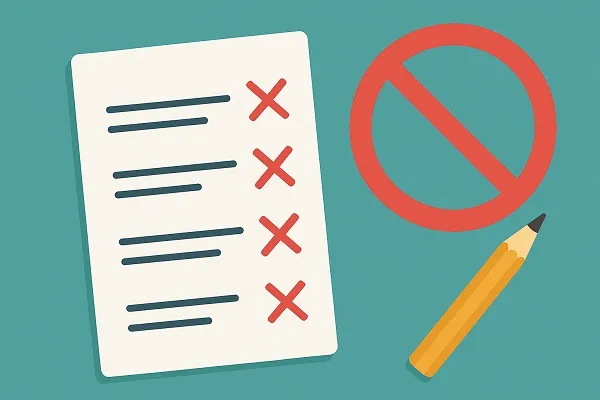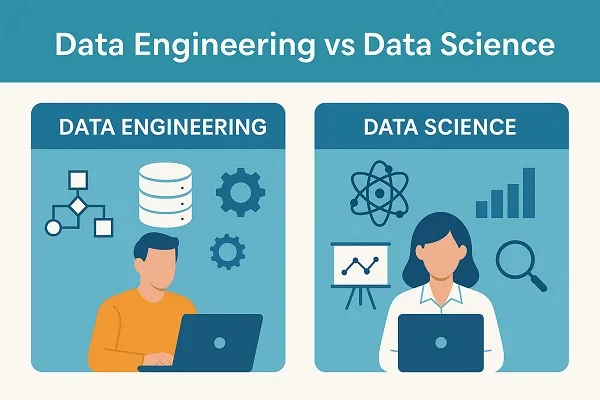Data Engineering vs Data Science is a common debate for companies building data-driven products, analytics pipelines, or machine learning models. Choosing between hiring a data engineer or a data scientist depends heavily on your business goals, data maturity, and the challenges you’re facing.
Both roles work with data, but they offer different skill sets, responsibilities, and value. Understanding these differences is essential for making the right hiring decision.
What Is Data Engineering?
Data engineering focuses on building and maintaining the systems and architecture that allow data to be collected, stored, and made available for analysis. It forms the foundation upon which data science, analytics, and machine learning can function effectively.
Responsibilities of a Data Engineer:
- Design, build, and manage data pipelines
- Develop ETL (Extract, Transform, Load) processes
- Optimize data storage and retrieval systems
- Ensure data quality, integrity, and availability
- Maintain data lake and data warehouse infrastructure
- Work with cloud platforms (AWS, Azure, GCP)
Typical Tools and Technologies:
- Programming: Python, Java, Scala
- Databases: SQL, PostgreSQL, MongoDB
- Big Data: Hadoop, Spark, Kafka
- Cloud Services: Amazon Redshift, Google BigQuery, Azure Data Factory
- Workflow Orchestration: Airflow, Luigi
Data engineers are the backbone of a modern data ecosystem. Without them, raw data would be too chaotic or incomplete for meaningful use.
What Is Data Science?
Data science is focused on analyzing, interpreting, and generating insights from data. Data scientists use statistical techniques, machine learning models, and domain knowledge to turn raw data into actionable recommendations.
Responsibilities of a Data Scientist:
- Analyze large datasets to discover trends and patterns
- Build predictive models and machine learning algorithms
- Perform statistical testing and data validation
- Visualize data using dashboards and reports
- Communicate findings to stakeholders
- Collaborate with business and product teams to solve specific problems
Typical Tools and Technologies:
- Programming: Python, R
- Machine Learning: Scikit-learn, TensorFlow, PyTorch
- Data Analysis: Pandas, NumPy, Matplotlib, Seaborn
- Visualization: Tableau, Power BI, Plotly
- Notebooks: Jupyter, Google Colab
While data scientists are great at delivering insights, they often rely on data infrastructure built by engineers to perform their work effectively.
Key Differences Between Data Engineers and Data Scientists

Understanding the key differences can help you assess which role you truly need.
| Aspect | Data Engineer | Data Scientist |
|---|---|---|
| Primary Focus | Infrastructure and data architecture | Analysis, insights, and modeling |
| Core Skills | Software engineering, data pipelines | Statistics, machine learning, analytics |
| Goal | Make data available and reliable | Derive insights and predictions |
| Output | Clean, well-structured datasets | Reports, dashboards, ML models |
| Interaction | Works with IT and data teams | Works with product and business teams |
When to Hire a Data Engineer
Hiring a data engineer is the right choice if you’re dealing with fragmented, unstructured, or siloed data sources and need to build the foundation for a scalable analytics or ML workflow.
You should consider a data engineer if:
- Your company lacks a central data repository or pipeline
- You’re collecting large volumes of data from multiple sources
- You’re facing issues with data quality or consistency
- Your analytics or science teams can’t access clean data
- You plan to migrate data infrastructure to the cloud
Without a solid data foundation, advanced analytics or machine learning initiatives are likely to fail or stall.
When to Hire a Data Scientist
A data scientist adds value when your organization already has usable data and wants to leverage it for insights, forecasting, and decision-making.
You should consider a data scientist if:
- Your data infrastructure is in place and accessible
- You want to identify business trends or customer behavior
- You’re looking to build predictive models or recommender systems
- You need help with data visualization and storytelling
- Stakeholders demand data-backed decision support
If you already have high-quality data, hiring a data scientist helps you turn that resource into competitive advantage.
Do You Need Both?
In many cases, companies need both data engineers and data scientists—but not necessarily at the same time.
Early Stage Startups:
- Start with a data engineer to set up pipelines and data storage
- Bring in a data scientist later once there’s enough clean data
Mid-Sized Companies:
- Hire a data scientist only if your infrastructure can support analytics
- Consider a hybrid role (e.g., Analytics Engineer) if budget is limited
Large Enterprises:
- Separate teams with distinct roles for data engineering and data science
- Collaborate through a shared data platform and governance framework
Proper sequencing of hires based on your company’s data maturity can save time, reduce redundancy, and maximize return on investment.
Common Mistakes to Avoid

Mistaking One Role for the Other
Hiring a data scientist expecting them to build pipelines or manage data lakes often leads to frustration. Likewise, hiring a data engineer to “do AI” is unlikely to meet your goals.
Skipping Infrastructure
Jumping straight to analytics without strong data engineering results in delays, model errors, and credibility issues.
Underestimating Collaboration Needs
These two roles often need to work hand-in-hand. Set clear expectations and build bridges between them early on.
How to Decide Who to Hire First
Ask the following questions:
- Do you have clean, accessible, and centralized data?
- Are you trying to solve infrastructure problems or analytical ones?
- Are your teams spending more time gathering data than analyzing it?
- Do stakeholders want dashboards or better pipelines?
If your data is scattered or hard to trust—hire a data engineer.
If you have quality data but struggle to get insights—hire a data scientist.
Real-World Hiring Scenarios
Scenario 1: SaaS Startup With Usage Data
You’re collecting user interaction logs but don’t yet have a data warehouse. Your analysts complain about inconsistent data.
→ Start with a data engineer to build ETL pipelines and centralize data.
Scenario 2: Retail Business With Structured Sales Data
You already have clean sales data in a cloud data warehouse. Executives want demand forecasting and churn prediction.
→ Hire a data scientist to unlock predictive insights.
Scenario 3: E-commerce Platform With Growth Ambitions
You’re scaling fast. You want better reporting, faster data availability, and customer personalization.
→ Hire both, starting with a data engineer. Add a data scientist once the pipeline is stable.
Hiring the right role at the right time is crucial for scaling your data strategy. Data engineering and data science are not interchangeable, and each brings unique value depending on your stage, needs, and goals.
If you’re starting from scratch, build your data foundations first with a strong engineering hire. If your data is already in place, bring in science talent to turn it into strategy. Either way, a clear understanding of each role helps you hire smart—and grow faster.
Content reviewed and published by Tier2Tek Staffing Editorial Team .

